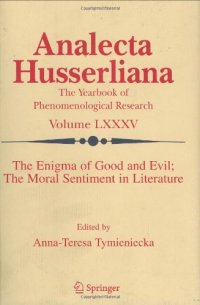
Ebook: The Enigma of Good and Evil; The Moral Sentiment in Literature
- Tags: Ethics, Phenomenology, Aesthetics, Philosophy of Mind
- Series: Analecta Husserliana 85
- Year: 2005
- Publisher: Springer Netherlands
- Edition: 1
- Language: English
- pdf
Striking toward peace and harmony the human being is ceasely torn apart in personal, social, national life by wars, feuds, inequities and intimate personal conflicts for which there seems to be no respite. Does the human condition in interaction with others imply a constant adversity? Or, is this conflict owing to an interior or external factor of evil governing our attitudes and conduct toward the other person? To what criteria should I refer for appreciation, judgment, direction concerning my attitudes and my actions as they bear on the well-being of others?
At the roots of these questions lies human experience which ought to be appropriately clarified before entering into speculative abstractions of the ethical theories and precepts. Literature, which in its very gist, dwells upon disentangling in multiple perspective the peripeteia of our life-experience offers us a unique field of source-material for moral and ethical investigations.
Literature brings preeminently to light the Moral Sentiment which pervades our life with others -- our existence tout court. Being modulated through the course of our experiences the Moral Sentiment sustains the very sense of literature and of personal human life (Tymieniecka).
Striking toward peace and harmony the human being is ceasely torn apart in personal, social, national life by wars, feuds, inequities and intimate personal conflicts for which there seems to be no respite. Does the human condition in interaction with others imply a constant adversity? Or, is this conflict owing to an interior or external factor of evil governing our attitudes and conduct toward the other person? To what criteria should I refer for appreciation, judgment, direction concerning my attitudes and my actions as they bear on the well-being of others?
At the roots of these questions lies human experience which ought to be appropriately clarified before entering into speculative abstractions of the ethical theories and precepts. Literature, which in its very gist, dwells upon disentangling in multiple perspective the peripeteia of our life-experience offers us a unique field of source-material for moral and ethical investigations.
Literature brings preeminently to light the Moral Sentiment which pervades our life with others -- our existence tout court. Being modulated through the course of our experiences the Moral Sentiment sustains the very sense of literature and of personal human life (Tymieniecka).